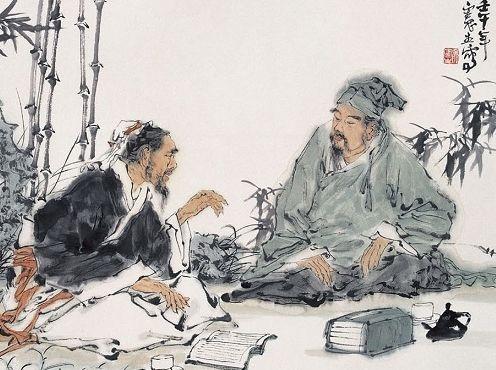*text mentioned in Jiang Hu Road Is Curved chapter two

{{Suffering is living, happiness is death}} from {{Mencius · Gao Zi}}
[Emperor] Shun was appointed from among the fields, Fu Yue was selected whilst building walls[1], Jiao Ge was selected whilst selling fish and salt, Guan Yi Wu was selected from the hands of the prison officials, Sun Shu Ao was selected from the seaside, Bai Li Xi was selected from the marketplace. (All names mentioned are notable figures in the imperial court that had rose from a lowly status)
Therefore, when the heavens drop major responsibilities and burdens onto such people, it must certainly first have them experience distress before developing strong will, have them worked tirelessly to the bones, have their body and skin endure hunger, have their being subjected to extreme poverty, have them act in line of overthrown confusion, in order to awaken the tenacious nature of the heart and mind, increasing the never before had talents.
People often makes mistakes, before they are willing to correct [themselves]; heart trapped in distress, thoughts blocked away, before something can be done; face looking gaunt, voice sounding exasperated, before one is understood. Should there not be any ministers and wise men making testimonies within the country, should there not be any enemy states and foreign aggression from outside the country, the country often perishes.
And then learns that those that suffer hardships, lives on, those that enjoys peace and happiness, dies.
–
[1] The specific wall constructing work mentioned here is bǎn zhù / 版筑 which a method of building walls by stamping earth between board frames.
《生于忧患,死于安乐》选自《孟子·告子下》
舜发于畎亩之中,傅说举于版筑之中,胶鬲举于鱼盐之中,管夷吾举于士,孙叔敖举于海,百里奚举于市。
故天将降大任于是人也,必先苦其心志,劳其筋骨,饿其体肤,空乏其身,行拂乱其所为,所以动心忍性,曾益其所不能。
人恒过,然后能改;困于心,衡于虑,而后作;征于色,发于声,而后喻。入则无法家拂士,出则无敌国外患者,国恒亡。
然后知生于忧患,而死于安乐也。
{{Shēng yú yōuhuàn, sǐ yú ānlè}} xuǎn zì {{mèngzǐ·gào zi xià}}
Shùn fā yú quǎn mǔ zhī zhōng, fù shuō jǔ yú bǎn zhù zhī zhōng, jiāo gé jǔ yú yú yán zhī zhōng, guǎn yíwú jǔ yú shì, sūnshū’áo jǔ yúhǎi, bǎi lǐ xī jǔ yú shì.
Gù tiān jiāng jiàng dàrèn yúshì rén yě, bì xiān kǔ qí xīnzhì, láo qí jīngǔ, è qí tǐ fū, kōngfá qí shēn, xíng fú luàn qí suǒ wéi, suǒyǐ dòngxīn rěn xìng, céng yì qí suǒ bùnéng.
Rén héngguò, ránhòu néng gǎi; kùn yú xīn, héng yú lǜ, érhòu zuò; zhēng yú sè, fā yú shēng, érhòu yù. Rù zé wúfǎ jiā bì shì, chū zé wúdí guówài huànzhě, guó héng wáng.
Ránhòu zhīshēng yú yōuhuàn, ér sǐ yú ānlè yě.
{{Mencius · Gao Zi}} is a collection of written dialogues between Mencius and Gao Zi’s debates on human nature.
Text translated from: http://baike.baidu.com/subview/660910/16497137.htm

Thank you so much!! 😘😘😘
LikeLike